At Glooko, we are committed to simplifying diabetes insights and management for people living with diabetes and healthcare providers alike. That’s why our platform is compatible with more than 200 diabetes and health monitoring devices and growing.
As a company, we could not be more pleased to share that we recently expanded our capabilities to integrate with Abbott’s FreeStyle Libre CGMs in the United States. This integration brings glucose data to more clinics and health systems in our all-in-one solution for diabetes management.
This milestone is more than just a technological advancement — it’s about empowering people with Type 1, Type 2, and gestational diabetes, as well as prediabetes, to become active owners in their health. By combining the precision of Abbott’s FreeStyle Libre CGMs with Glooko’s comprehensive platform, we can provide people living with diabetes and their care teams, including endocrinologists and nurses, with a unified, holistic view of diabetes management and irrefutable information.
From glucose trends to lifestyle behaviors like diet and physical activity, this latest integration ensures that critical insights are easily accessible when and where they are needed most. For healthcare providers and health systems, this means the ability to seamlessly access and analyze patients’ CGM data through Glooko and established electronic health record (EHR) solutions, more informed decision-making, and improved patient outcomes. For people living with diabetes, it means greater confidence in their care and health.
As the number of people with diabetes continues to grow, the need for seamless, data-driven solutions has never been greater. Our new integration with Abbott’s FreeStyle Libre CGMs represents a significant step forward in delivering better, more connected care. This partnership is sure to have a positive impact on the millions of people who rely on FreeStyle Libre CGMs and Glooko.
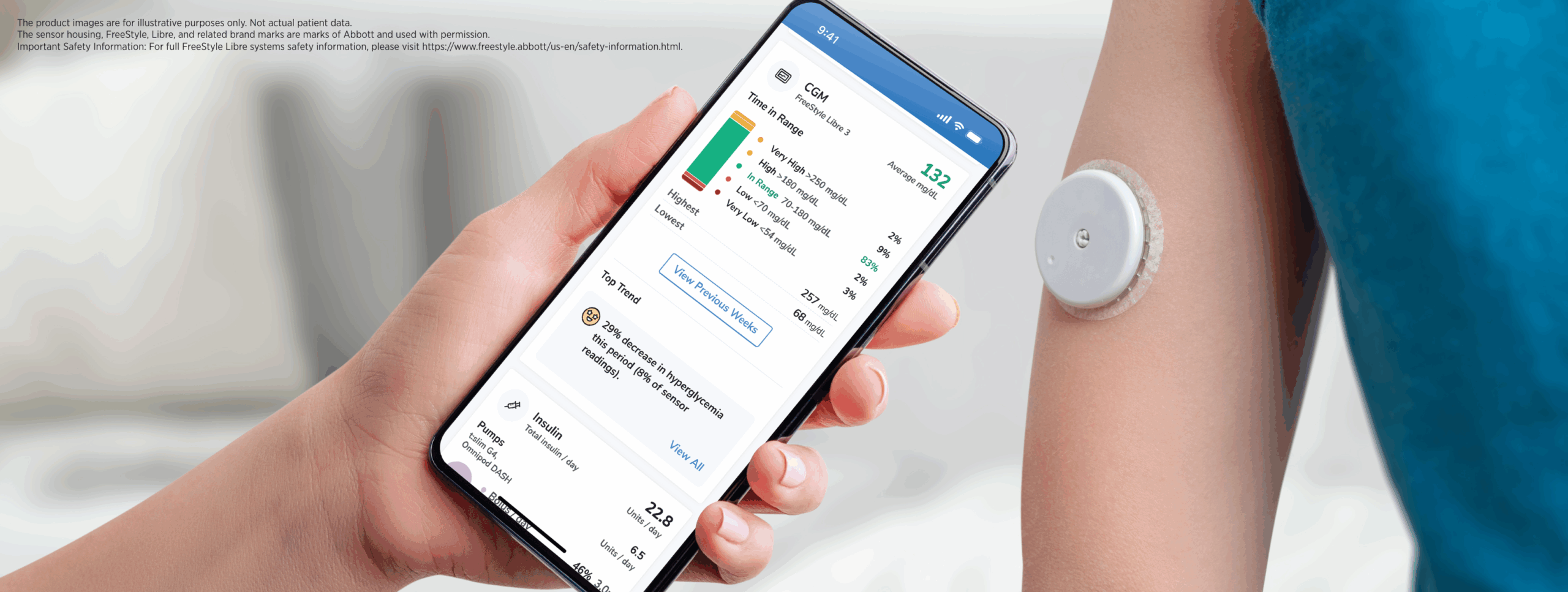
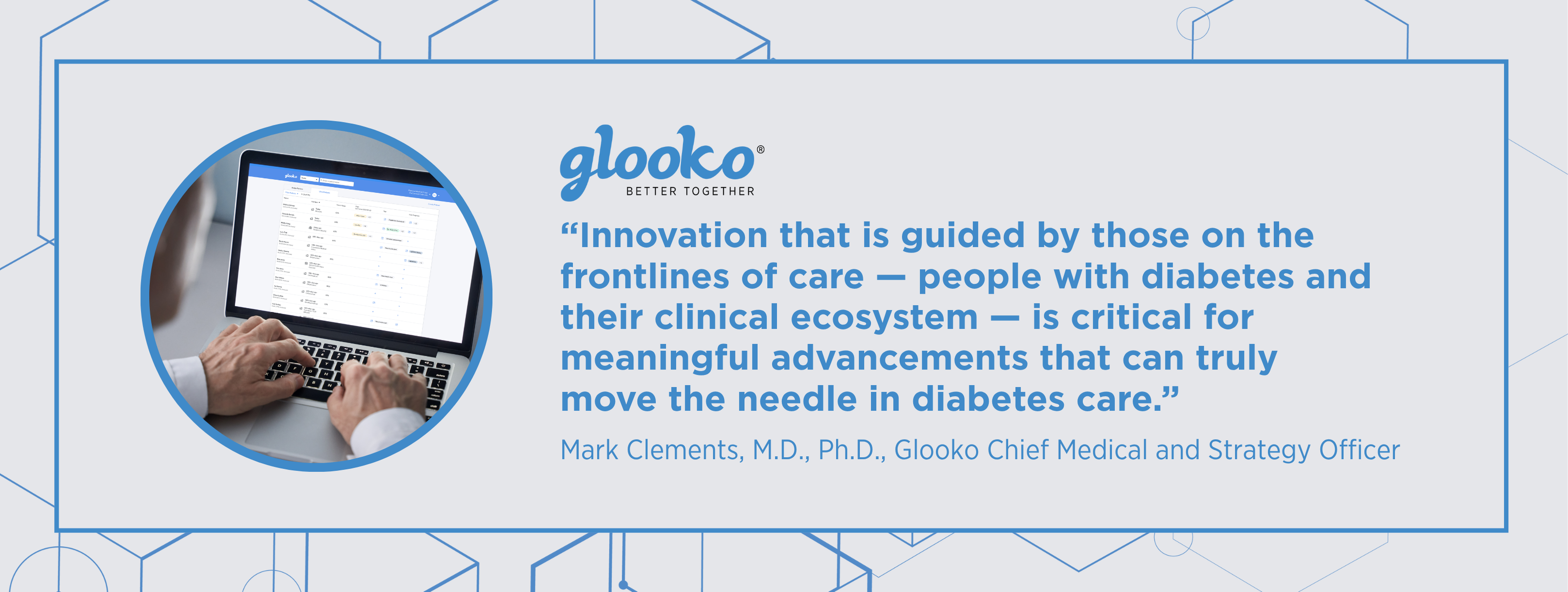

As healthcare providers, we find ourselves at a pivotal moment in diabetes management. Technological advances — from remote patient monitoring to artificial intelligence — have dramatically reshaped patient care. Yet, amid these innovations, a crucial element often remains overlooked: the voices of clinicians and people with diabetes.
In my new expanded role as Chief Medical and Strategy Officer at Glooko, I am excited about the opportunity to transition from direct patient care into a broader role where I can continue to make a significant impact on diabetes management and improve the lives of people with diabetes. I believe my firsthand clinical experience positions me uniquely to guide Glooko’s innovation efforts, ensuring we build tools that genuinely meet the needs of clinicians and people with diabetes alike.
In my nearly two decades as a pediatric endocrinologist, I’ve observed the profound potential—and the challenges—of integrating digital solutions into daily diabetes management. Clinicians routinely manage a complex array of tasks: reviewing glucose data from continuous glucose monitors (CGMs) or meters, adjusting insulin regimens, coaching patients on lifestyle, documenting clinical decisions, and coordinating across care teams. With a single person’s CGM device generating up to 288 data points per day, 1 clinicians managing numerous people with diabetes face overwhelming workloads.
Individuals with diabetes echo similar concerns. Many describe data fatigue from constant management and analysis of their glucose levels. As one person stated, “The data is overwhelming; without clear insights and simpler ways to interpret it, it’s just noise.”
Although this wealth of data is invaluable, it contributes significantly to clinician burnout, and burn out among people with diabetes. Alarmingly, half to two-thirds of clinicians experience burnout, driven largely by bureaucratic tasks, extended working hours, and the sheer volume of data management.2,3
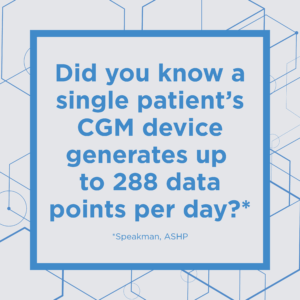
Individuals with diabetes also report significant stress from managing their condition daily. Every glucose reading can feel like a pass or fail test. Effective technological integration could alleviate such emotional burdens by making data actionable, intuitive, and less intrusive.
At Glooko, we recognize that technology alone is not sufficient—it must seamlessly integrate into clinician workflows. Clinicians offer essential insights into behaviors of individuals, adherence barriers, and preferences. Unfortunately, many digital diabetes solutions miss the mark due to inadequate clinician input, leading to underutilization—only about 40% see active clinical use.4 Glooko addresses this by ensuring clinician insights directly shape our technology, streamlining workflow integration through interoperability with electronic health records (EHRs).
In a similar vein, simplicity and intuitive user experiences are paramount for people with diabetes to properly leverage diabetes management technologies. If the technology is complicated, it just becomes another barrier.
Today, our connected care platform exemplifies this integrated approach, merging patient-generated data with clinical decision-making tools. Evidence demonstrates connected care significantly improves diabetes outcomes, with reductions in HbA1c levels of up to 1.5% and fewer hypoglycemic events.5 Glooko enables clinicians to swiftly identify high-risk trends and proactively manage care for people with diabetes.
Tomorrow, AI-driven predictive analytics within Glooko could transform diabetes management by forecasting hypoglycemic and hyperglycemic events, facilitating timely, preventive interventions. Automating routine data analysis tasks can reduce clinicians’ documentation burdens by approximately 30%,6,7 significantly alleviating stress and freeing clinicians to focus more deeply on clinical interactions. For people with diabetes, this can provide a significant improvement in their overall diabetes management.
I believe Glooko has immense potential, especially through advanced analytics and decision support. For instance, we could empower clinicians to shift from generalized treatment plans to highly personalized management strategies, grounded in timely data.
Innovation that is guided by those on the frontlines of care — people with diabetes and their care providers — is critical for meaningful advancements that can truly move the needle in diabetes care. In my role, I am dedicated to ensuring our solutions enhance workflows, support better outcomes, and ultimately bring a human-centric approach to diabetes management.
Together, we will define the future of diabetes care, directly addressing challenges clinicians face and improving the lives of those we treat. Here’s to a bright future ahead!
1. Speakman, ASHP. 2. Hammes et al., Endocrine News; Medscape Endocrinologist Lifestyle Report, 2022. 3. Batta et al., BMJ Open Diabetes Res Care. 4. Shah et al., J. Diabetes Sci Technol., 2023.5. Su et al., J. Med Internet Res., 2023. 6. AMA Digital Health Report. 7. Sidharthan et al., Scientific Reports, 2025.
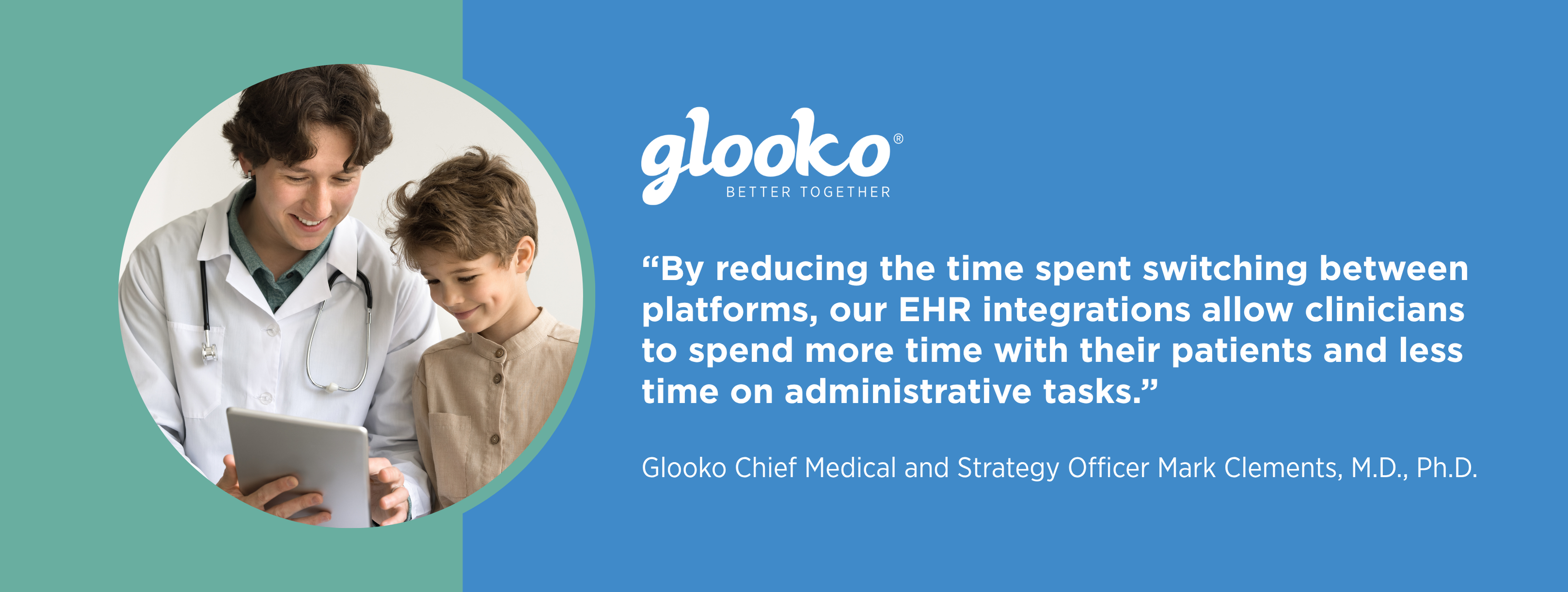

At Glooko, we empower healthcare providers with the tools and insights they need to make informed decisions quickly and easily to improve the health outcomes of their patients living with diabetes.
With nearly half of physicians reporting at least one burnout symptom in a recent study from the American Medical Association, it’s critical we make diabetes data management simpler to not overburden those providing care.
That’s why the Glooko platform integrates with leading electronic health record (EHR) systems in the U.S., including Epic, Oracle Health, MEDITECH, Greenway Health, eClinicalWorks, NextGen, and Athenahealth, making our diabetes management platform seamlessly and securely available within this critical healthcare technology and eliminating the need to platform switch.
Why EHR Integrations Matter
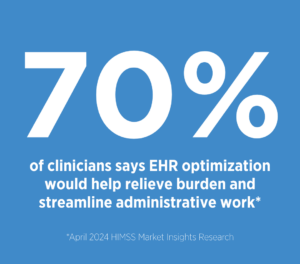 Diabetes care is complex, and healthcare providers face the challenge of managing patient data across multiple systems. In an era where time is precious and clinicians are already spending much of their time on administrative tasks, clinicians need timely access to the most relevant health data without the inefficiencies of navigating multiple data platforms.
Diabetes care is complex, and healthcare providers face the challenge of managing patient data across multiple systems. In an era where time is precious and clinicians are already spending much of their time on administrative tasks, clinicians need timely access to the most relevant health data without the inefficiencies of navigating multiple data platforms.
By integrating Glooko into EHRs, we streamline how healthcare providers access diabetes data, enabling them to provide the highest quality care. Our integrations provide clinicians and care teams with immediate access to comprehensive data from more than 200 diabetes and health monitoring devices used by their patients, eliminating the need for additional logins and manual data entry by people living with diabetes each day.
EHR integrations not only optimize existing systems, but they also have the potential to enhance clinical decision-making by giving clinicians the full picture of a person’s health. It empowers them to make faster, more informed treatment decisions. That’s why health systems spend $2.5 million to $1.2 billion on EHR integrations each year. They’re powerful and their care teams can reap the benefits of reduced documentation burden.
How It Works
By leveraging SMART on FHIR technology and HL7, standard interoperability frameworks, Glooko integrates with existing EHR systems at hospitals and health systems. Healthcare providers can then access patients’ timely glucose data, medication logs, activity levels, food intake, and much more without leaving the EHR.
The integrations support healthcare systems by offering a single, unified view of a person’s diabetes information, all while ensuring secure, HIPAA-compliant data exchange. The technology is designed to streamline workflows, making it easier for clinicians to focus on what truly matters: providing quality care for their patients.
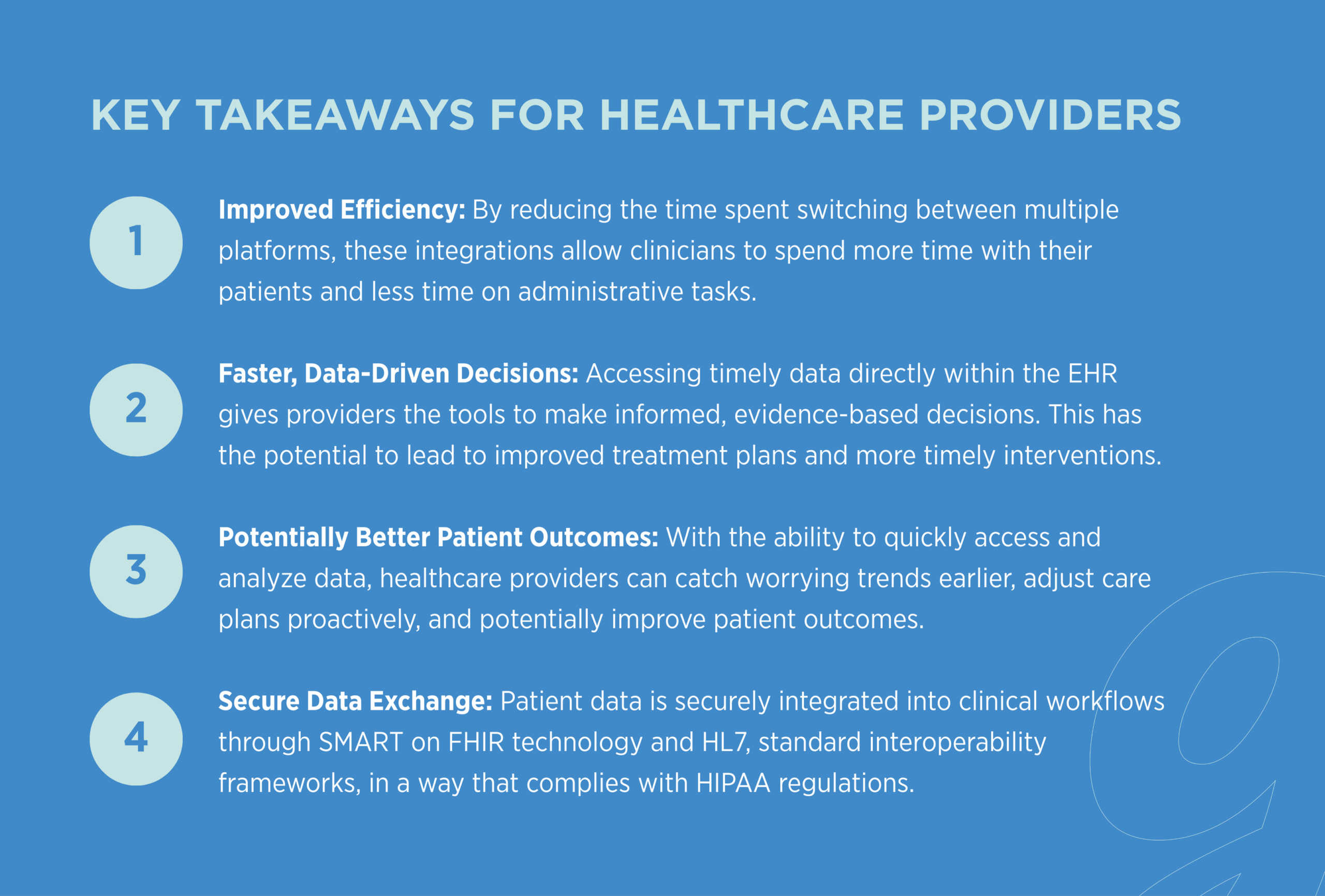
A Step Toward the Future of Diabetes Care
Following the COVID-19 pandemic, clinical teams who provide care to the more than 38 million people in the U.S. living with diabetes have greatly declined in number, furthering the urgent need for seamless, data-driven solutions to help reduce administrative burdens and workloads that drive burnout.
- Since 2022, more than 138,000 nurses left the workforce due to stress, burnout, and retirement. New data from the NCSBN reveals almost 40% of nurses intend to leave the workforce by 2029, leaving the remaining time-pressed nurses to provide care to an already large patient population.
- Based on a recent GoodRx study, more than 70% of U.S. counties don’t have an endocrinologist and the number of trained endocrinologists is declining, meaning primary care providers must be knowledgeable in diabetes management and shoulder the workload.
- There is a significant shortfall of certified diabetes care and education specialists (CDCES), impacting diabetes care quality. In the U.S., there are about 19,500 diabetes educators — roughly 1 CDCES per 1,000 individuals with diabetes. An additional 35,000 educators would be required to meet the current demands of patients in the U.S. alone, furthering the workload burden.
And the burnout by clinicians and care teams is only going to grow greater as 98 million American adults have prediabetes, according to the CDC.
By optimizing and integrating with leading EHR systems, Glooko is taking a significant step forward in transforming diabetes management and reducing extra steps taken by healthcare providers to improve the quality of care. Our integrations help improve workflows, limit platform switching, simplify clinical decision-making, and support better outcomes for both healthcare providers and people with diabetes.
These integrations represent our ongoing commitment to delivering cutting-edge, interoperable solutions that empower both clinical teams and patients in making diabetes easier to manage.
Ready to Learn More?
Healthcare providers and hospital systems can access EHR integrations by reaching out to our dedicated team for a demo. With robust support from our dedicated team, some integrations, like with Epic, can be up and running within a weeks, making it easier than ever to take advantage of the benefits Glooko has to offer.
To learn more about Glooko’s many EHR integrations, visit our Integration Portal.
